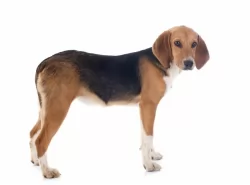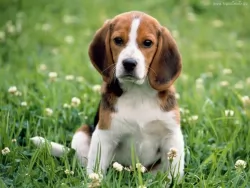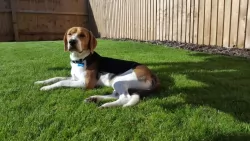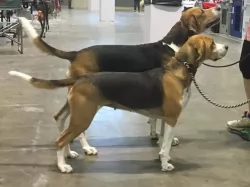 MyDogBreeds
MyDogBreeds Both Blue Picardy Spaniel and Beagle-Harrier are originated from France. Blue Picardy Spaniel may grow 11 cm / 5 inches higher than Beagle-Harrier. Both Blue Picardy Spaniel and Beagle-Harrier are having almost same weight. Both Blue Picardy Spaniel and Beagle-Harrier has almost same life span. Both Blue Picardy Spaniel and Beagle-Harrier has almost same litter size. Both Blue Picardy Spaniel and Beagle-Harrier requires Moderate maintenance.
Both Blue Picardy Spaniel and Beagle-Harrier are originated from France. Blue Picardy Spaniel may grow 11 cm / 5 inches higher than Beagle-Harrier. Both Blue Picardy Spaniel and Beagle-Harrier are having almost same weight. Both Blue Picardy Spaniel and Beagle-Harrier has almost same life span. Both Blue Picardy Spaniel and Beagle-Harrier has almost same litter size. Both Blue Picardy Spaniel and Beagle-Harrier requires Moderate maintenance.
 The Blue Picardy Spaniel is a direct descendent of the French spaniel. It was in the 14th century that recorded descriptions of the French ‘setting dogs’ emerged but it is believed that the spaniel originated before that.
The Blue Picardy Spaniel is a direct descendent of the French spaniel. It was in the 14th century that recorded descriptions of the French ‘setting dogs’ emerged but it is believed that the spaniel originated before that.
The spaniels separated into different regional types where size and colour varied according to the region they were in. It was developed in the northern part of France and bred with Gordon- and English Setters, resulting in a Belton blue color, which is a type of blue ticking coloration. The dog was recognized as a separate breed in France in 1938.
 The Beagle Harrier, the breed that was made mixing the France Scent Hounds and a Beagle.
It is not quite sure if this breed was made on purpose or the mix of the breeds happened and resulted in a great dog so the breeding continued.
Since they are not large dogs as hounds, they are used to hunt small animals.
The Beagle Harrier, the breed that was made mixing the France Scent Hounds and a Beagle.
It is not quite sure if this breed was made on purpose or the mix of the breeds happened and resulted in a great dog so the breeding continued.
Since they are not large dogs as hounds, they are used to hunt small animals.
This first breeding took place in England, but after the 14th century, they were breed on purpose in France.
 The medium-sized, well muscled Blue Picardy Spaniel has such an amicable expression on his face with such gentle brown eyes that it is difficult to think of him as a gun dog. He is often described as a quiet dog, but lots of fun. He has long legs and stands about 56–61 cm high at the withers, weighing about 19–20 kg. His speckled grey-blue coat with black patches is medium length and wavy and you’ll find typical Setter feathering on the legs, the tail and underside. The medium-length, drooping ears are also covered in silky, feathery hair, a blue/grey coat with black patches and has long feathering on the belly, legs, ears and tail. When the puppies are born they’re white with black patches, but this changes as they mature.
The medium-sized, well muscled Blue Picardy Spaniel has such an amicable expression on his face with such gentle brown eyes that it is difficult to think of him as a gun dog. He is often described as a quiet dog, but lots of fun. He has long legs and stands about 56–61 cm high at the withers, weighing about 19–20 kg. His speckled grey-blue coat with black patches is medium length and wavy and you’ll find typical Setter feathering on the legs, the tail and underside. The medium-length, drooping ears are also covered in silky, feathery hair, a blue/grey coat with black patches and has long feathering on the belly, legs, ears and tail. When the puppies are born they’re white with black patches, but this changes as they mature.
The Blue Picardy Spaniel is a loyal and devoted companion, who just loves to spend time with his human family. He loves to work hard and play hard and he makes a splendid family pet. He’ll also get along well with other pets. Treat him with love and care and you’ll find that the Blue Picardy Spaniel is an even-tempered pet who wants to please. Being alert, he will bark to warn you of strangers.
 The Beagle Harrier is a scent hound that is described as a big sized Beagle or a small sized Harrier. This breed was developed from this two breeds, actually. Despite the looks of these breeds, the Beagle Harrier is an energetic kind of dog who gets very attached to his family. This medium sized pet comes in variations of colours and they are usually tricoloured. They usually have dark coloured eyes, white paws, and They usually grow up to have a very muscular body, but, if you don’t provide them with the daily activity they need, they will quickly get obese and unhappy.
The Beagle Harrier is a scent hound that is described as a big sized Beagle or a small sized Harrier. This breed was developed from this two breeds, actually. Despite the looks of these breeds, the Beagle Harrier is an energetic kind of dog who gets very attached to his family. This medium sized pet comes in variations of colours and they are usually tricoloured. They usually have dark coloured eyes, white paws, and They usually grow up to have a very muscular body, but, if you don’t provide them with the daily activity they need, they will quickly get obese and unhappy.
 The Blue Picardy Spaniel is a gentle, intelligent breed and he responds well to training. He is such an easy going dog who wants to please his owners. They also do well with children and other pets, making him a wonderful family pet.
The Blue Picardy Spaniel is a gentle, intelligent breed and he responds well to training. He is such an easy going dog who wants to please his owners. They also do well with children and other pets, making him a wonderful family pet.
This excellent sporting dog bred in the Picardy region of France is sociable and amicable, a sought after companion animal in France. He is highly trainable breed and his wonderful nature makes him a wonderful choice for first-time dog owners. He is a gentle all-rounder who loves to be with family, making him an exceptional friend.
 The Beagle Harrier, if trained properly and socialized while he was still a pup, will be the great playmate for any child. They get along with strangers, as well. We might say that they will get along with anybody who is ready to run and play with him. Children are most likely that kind of playdate, so it appears that they like children more. The Beagle Harrier is a great family pet, and he is great with babies, toddlers, teenagers… so don’t be afraid to leave the dog alone during the playdate!
The Beagle Harrier, if trained properly and socialized while he was still a pup, will be the great playmate for any child. They get along with strangers, as well. We might say that they will get along with anybody who is ready to run and play with him. Children are most likely that kind of playdate, so it appears that they like children more. The Beagle Harrier is a great family pet, and he is great with babies, toddlers, teenagers… so don’t be afraid to leave the dog alone during the playdate!
hunting, scent tracking, search dog
Some will say that the Beagle Harrier is one of the most desirable pets because of his loving and lively nature. They get along with almost anyone and they don’t mind living indoors if you have the time to take him out for a daily run each day. They will do great in a large group of people and any public places so you can take your Beagle Harrier with you anywhere you go.
Since the Beagle Harrier is placed in a group of the hound dogs, you must be aware that he will have the attitude of the pack leader. Once you got the Beagle Harrier puppy, you must start training and socializing him in order to grow the pet that will be easy to handle and accepted by the family and all the people around you, even strangers. They are very intelligent and they have a calm nature so they will be quite easy to train.
 The Blue Picardy Spaniel is considered a healthy breed and there are no known genetic health issues. He is a rare dog breed and not excessively bred, meaning they aren’t prone to genetic health problems. When he is loved and well looked after, he can reach 14 years of age and beyond.
The Blue Picardy Spaniel is considered a healthy breed and there are no known genetic health issues. He is a rare dog breed and not excessively bred, meaning they aren’t prone to genetic health problems. When he is loved and well looked after, he can reach 14 years of age and beyond.
You won’t find more health issues with this breed than with other gun dogs. Always be looking out for hip dysplasia, a malformation of the hip joint. The socket of the hip is too shallow, resulting in damage to the joints of the dog, more so as it ages. Symptoms of hip dysplasia include stiffness and trouble with getting up after lying down.
 Almost every active dog suffers from joint diseases. Even though it’s generally a genetic disease, you can lower the chances of hip or elbow dysplasia by taking care of your dog’s weight, diet and daily exercise.
Almost every active dog suffers from joint diseases. Even though it’s generally a genetic disease, you can lower the chances of hip or elbow dysplasia by taking care of your dog’s weight, diet and daily exercise.
The Beagle Harrier has big ears that are always set down. That makes them ideal for the dirt accumulation, ear irritations and ear infections. Check his ears regularly and clean them at least once a week.
 The Blue Picardy is an energetic gun dog and he will certainly require a good deal of exercise. If he isn’t running around on a farm you will need to take him for walks regularly or let him off the leash in the park. He is always ready for ball games and just loves to play. It’s why he gets on well with children too- he loves the fun and games he gets.
The Blue Picardy is an energetic gun dog and he will certainly require a good deal of exercise. If he isn’t running around on a farm you will need to take him for walks regularly or let him off the leash in the park. He is always ready for ball games and just loves to play. It’s why he gets on well with children too- he loves the fun and games he gets.
He’ll need a high quality dog food that has been specially formulated for high energy dogs. Always follow the directions on the packaging. Home made food with meat, rice and vegetables is always a welcome change and remember to ensure he gets some raw meat into his diet too. Never deprive him of fresh, cool water. This should be readily available to him 24/7.
The Blue Picardy Spaniel is a moderate shedder with a couple of heavier shedding periods during the year. His grooming requirements are pretty moderate too and he will require a good brush twice a week to get rid of those loose hairs.
Other basic care for your beautiful pet includes clipping his nails, brushing his teeth 2 or 3 times a week, making use of a special dog toothbrush and toothpaste. His ears should certainly be checked for infection.
 Since the Beagle Harrier is an active dog breed, they will need food for the active dogs. Make sure you provide them with quality food that will give them enough strength to get through the very active day, and not gain too much of the weight. It is very important that you don’t overfeed him because this breed quickly becomes obese. It is advisable to use treats while you train him to do new tricks, but be very careful with the amount you give to the dog.
Since the Beagle Harrier is an active dog breed, they will need food for the active dogs. Make sure you provide them with quality food that will give them enough strength to get through the very active day, and not gain too much of the weight. It is very important that you don’t overfeed him because this breed quickly becomes obese. It is advisable to use treats while you train him to do new tricks, but be very careful with the amount you give to the dog.
Puppies need to be fed only two times a day. Once you decide which brand of food you will use, stick with them until the dog is 6 months old. Make sure they have enough nutrients and the quality ingredients that will help them with growing strong and healthy bones.
If you want Beagle Harrier to grow up in a happy and healthy dog, make sure you provide him with quality food, lots of exercises and unconditional love. They are extremely loving and they get depressed if left alone. Grooming tips are very clear – they need a regular brush because shed a lot. The more you brush, the less hair you will find on your hands during the belly rubs.
If your Beagle Harrier is trained and socialized, the dog park will be the best daily activity for him. If there is no dog park near your house, take him to the bike ride, jogging, swimming, hiking, markets, parks… They love to be off the leash and with people but since they are the hound dogs, don’t be surprised if they get distracted by smelling something more interesting than the ball. They would love to grow up in a house with a large yard, but, if you live in the apartment, make sure that you take time for his daily activity.